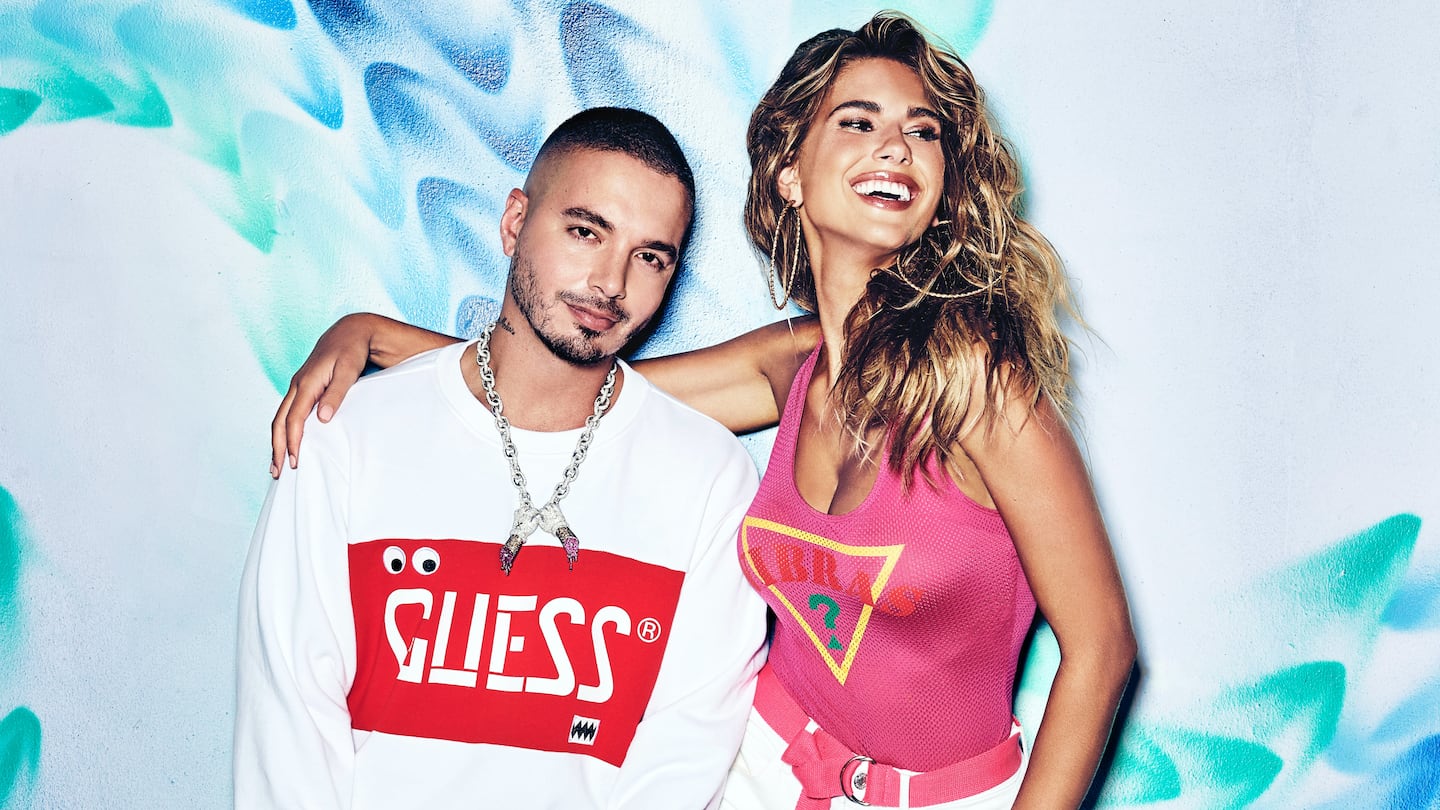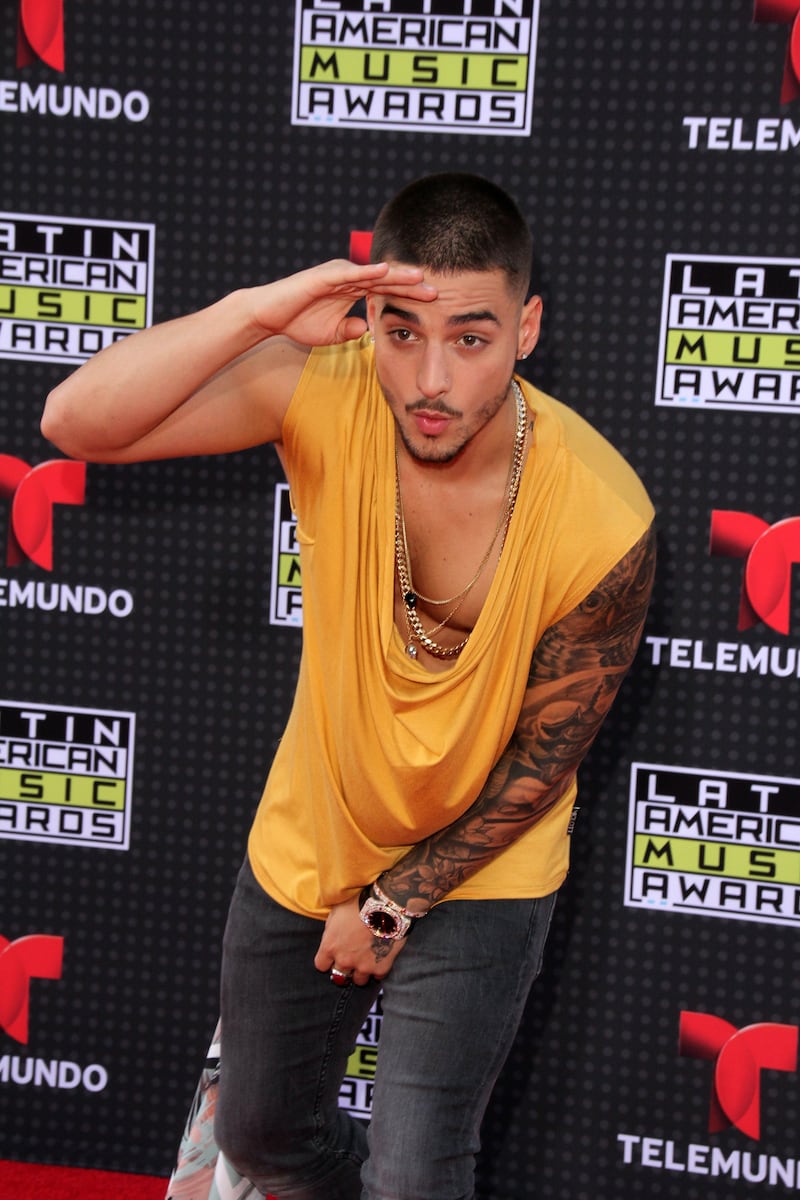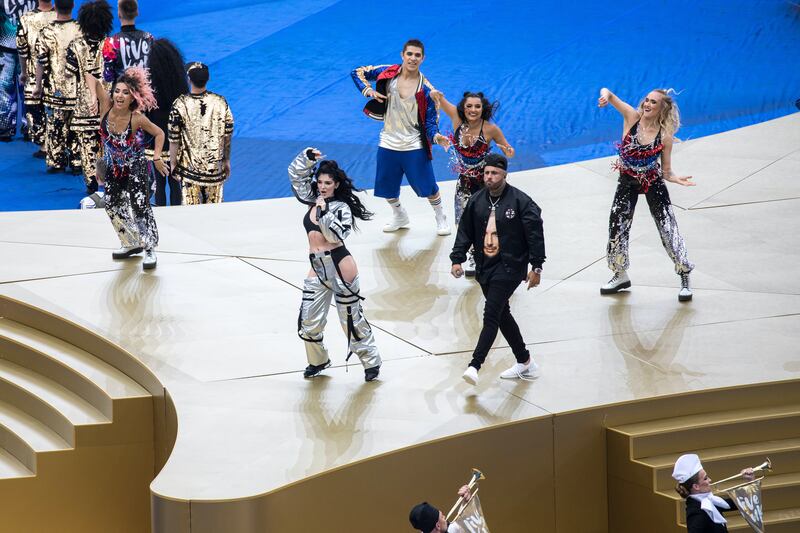
The Business of Fashion
Agenda-setting intelligence, analysis and advice for the global fashion community.

Agenda-setting intelligence, analysis and advice for the global fashion community.

LAS VEGAS, United States — Tonight, eight million viewers are tuning in to watch the 19th edition of the Latin Grammys. All eyes are on Colombian singer J Balvin, who, with eight nods, is the most nominated artist of the night. At 33, Balvin is the face of hottest music genre of the moment — reggaeton, a mixture of hip hop, Latin and Caribbean music often sung in Spanish. In June, the Latino superstar who boasts collaborations with the likes of Pharrell, Justin Bieber and Beyoncé and whose music videos regularly reach over a billion views, dethroned Drake as the most streamed artist on Spotify.
Balvin’s success has been years in the making. Since debuting over a decade ago in his native Medellin, he has set out on a mission to cross the language barrier and change the often negative and “erroneous” stereotypes of Latinos around the world, he tells BoF.
If securing brand endorsements is any measure of creating a successful platform, he is certainly on his way to achieving it. Some of the world’s most coveted fashion and luxury brands are now looking to Balvin and a new wave of reggaeton stars as marketing machines.
“Our contribution to fashion is becoming more accepted,” Balvin tells BoF.“We’ve been showing how this music has become global [and] it’s part of the mainstream now.”
ADVERTISEMENT
Accepted is an understatement. Balvin can be spotted sitting front-row at Louis Vuitton and Chanel, and last year he became one of New York Fashion Week: Men's ambassadors. He's fronting the Guess Spring/Summer 2019 ad campaign and is also representing Tag Heuer, among other lucrative deals.
Stars With Staggering Reach
Balvin has secured 11 No. 1 Latin singles, more than 50 million social media followers, and over 10 billion total YouTube views. By bringing American artists to his side rather than appeasing English-speaking audiences like predecessors Shakira or Ricky Martin did, Balvin is showing everyone — artists and audiences alike — a more modern Latin perspective.
“When we met last year at ComplexCon, I was extremely impressed with his knowledge of contemporary art, fashion and culture,” says Paul Marciano, co-founder and chief creative officer of Guess Inc., who art directed the denim brand’s Spring 2019 ad campaign starring Balvin alongside models including Sofia Jamora and Kara Del Toro.
“Through the years, Balvin has played an integral role in rapidly changing the entire landscape of pop music as a reggaeton singer, and I’m always inspired and energised to work with these types of creative forces,” adds Marciano, suggesting that it is Balvin’s “tastemaker” status both within and beyond Latin American markets that makes him so attractive.
Meanwhile, another Colombia native Maluma — dubbed the "pretty boy" of reggaeton — has been leveraging fashion to "push his entertainment factor," says celebrity stylist Irma Martinez, who has worked with Shakira, Ricky Martin and Sofia Vergara among many other Latin superstars.
Maluma’s good looks and charisma, coupled with his Instagram following of 36 million, have made him a Dolce & Gabbana favourite. He not only walked in and performed at their Autumn/Winter 2018 show earlier this year, but the designer duo is providing over 200 looks for his entire tour, a first for an artist of his kind.

Maluma at the Latin American Music Awards in 2015 | Source: Shutterstock
ADVERTISEMENT
Marketing for the New Mainstream
The reason that reggaeton is now making waves beyond Latin audiences and rapidly growing in popularity is that it is going through a transformation. The genre’s sound, which draws from Jamaican dance-hall reggae, Dominican dembow and rap, has softened and become more melodic in recent years.
“Even the lyrics have changed [and have become more romantic]” says Edmundo Bianchi, a personal branding specialist at Axius, a Mexico-based consultancy firm, “the message, and how they’re approaching music is changing.”
The genre, which is believed to have originated in Panama, draws its original aesthetic from the rough streets of urban Puerto Rico where reggaeton took off in the 2000s. “As reggaeton was crossing over, it was kind of parallel to rap artists' style, so it was very much a street-edge look and the branding attached to it,” says Michelle Rivera, who studies the genre as a post-doctoral fellow at the University of Michigan.
Bianchi points out that reggaeton artists are now trying to leave behind that “broken” street image and “make the concept of urban music a lot more stylish,” which he believes comes as a natural result of the genre's musical evolution.
“In Colombia, they were copying what was happening in Puerto Rico at first," says Miguel Ortiz, Maluma’s drummer for the past three years. He thinks Colombian artists stood out because "they adapted the reggaeton to [who and what] they were,” adding that “urban music [styles like reggaeton are] today’s new pop.”
“I think the fashion industry was definitely tracking that shift,” says Rivera. She explains that the genre’s opening to other forms of expression, “brought those artists into the fold” [which led them] “to start popping up at fashion shows”.
Now, Puerto Ricans are making a comeback on the reggaeton influencer scene. Last year, Yandel joined the likes of A$AP Rocky, Jay Z and Big Sean as a Puma ambassador, and Nicky Jam became the first Latin music star to be associated with luxury watch brand Hublot.
ADVERTISEMENT
“He is definitely the correct match for us,” says Ricardo Guadalupe, CEO of Hublot. “Nicky is driven by a talent that has made him into a global star,” Guadalupe adds, citing Nicky’s performance at the World Cup this summer and adding that the singer’s positive energy is a perfect fit for the brand.

Nicky Jam performs with Era Istrefi in 2018 | Source: Shutterstock
Cross-Generational Phenomenon
There is no doubt that reggaeton stars are providing luxury brands with a new gateway into a lucrative market. As Karla Martinez, editor in chief of Vogue Mexico and Latin America puts it, "brands want to reach new audiences [and] these artists not only have a massive engagement, but they have an [enviable] 'cool factor.'"
What makes them unique as musician influencers, however, is that, “they get the attention of different generations, from Z through [to] X,” she explains. It is this cross-generational appeal that adds to their bankability for certain fashion and luxury brands.”
In the US alone, Hispanics currently have $1.7 trillion worth of purchasing power, according to Statista. Moreover, Fitch Solutions predicts that the total clothing and footwear spend in Latin America will reach $189 billion by 2022. Vogue’s Martinez points out that many of these consumers feel they have been “ignored in the past and are now being taken it into account.”
Lany Blanco, the president and founder of Editorial Link, a monitoring agency that tracks the editorial coverage of luxury brands in Latin America and the Caribbean, explains that reggaeton stars are “a way to tap into a market [brands] weren’t targeting before,” adding that luxury brands are no longer only looking to target the old money and new money demographics in the region, but expanding “into other areas, markets, demographics and tastes.”
But the music genre, which has grown 119 percent from 2014 to 2017 — beating pop 13 percent and hip-hop 86 percent in the same period, according to Spotify’s figures — is being streamed in places as unexpected as Singapore, and not just by Latinos.
“[Reggaeton has] come full circle into the mainstream for its ability to truly capture audiences globally, it’s a perfect match for these fashion brands that are going after the exact same audiences,” says Michelle Rivera. “I was concerned it would never fully crossover because of the language barrier, but Daddy Yankee has a song with Janet Jackson and she's performing it in Asia.”
Last year’s worldwide explosion of Luis Fonsi and Daddy Yankee’s “Despacito” was considered a milestone moment. It became the most viewed video in Youtube history, with 5.6 billion views, leading the crossover of foreign language hits more than any other song.
Women on the Rise
Reggaeton remains a male-dominated genre but fast rising bilingual stars such as Cuban pop singer Camila Cabello have provided brands with a much-welcomed opportunity to take advantage of this cross-cultural phenomenon while marketing to women. Her chart-topping hits, which include collaborations with J Balvin and reggaeton legends like Pitbull and Daddy Yankee, have prompted a beauty collection with L’Oreal, a Guess Campaign and the covers of countless magazines.
Cabello’s Vogue Mexico and Latin America cover this March, is "the most successful of the year," according to Martinez. “She represents a new generation of Latin artists who sing both in English and Spanish,” she says, referring to Cabello’s Grammy wins earlier this year as a highlight.
It is only a matter of time before the other women from the reggaeton scene land high-profile fashion deals.
Meanwhile, 26-year-old rap sensation Cardi B, who is of Dominican and Trinidadian descent, has been making fashion moves of her own. Her salsa-flavoured hit "I Like It" featuring Bad Bunny and J Balvin earned her a second Billboard Hot 100 No. 1, a first for a female rapper. Her first Billboard hit "Bodak Yellow," which mentions "red-bottom" shoes, allegedly upped sales for Louboutin.
In addition to having brands like Moschino and Dolce & Gabbana lining up to dress her, and a Tom Ford Lipstick in her name, she announced a much-anticipated fashion line with the e-tailer Fashion Nova set to launch November 15.
“Cardi B is everything that is going on in the world right now, says Edmundo Bianchi. “She’s black, she’s Latina, a rapper and an urban music artist.”
It is only a matter of time before the other women from the reggaeton scene land high-profile fashion deals. Last year Dominican artist Natti Natasha became the most viewed woman on Youtube, while her hit “Criminal” with Puerto Rico’s Ozuna, bumped "Despacito" from the top spot. Other recent chart-toppers include Mexican-American Becky G, Colombian Karol G and the Brazilian bombshell Anitta who sings in Portuguese, English and Spanish, which makes her even more bankable.
Rivera believes that women are in a great place now to “reap the same commercial benefits that these men have been reaping for a long time.” “There's a lot more opportunity," now that there are many more women in the scene than there were in the early 2000s when the genre first boomed in Latin America.
Digitally Savvy Chameleons
Both male and female Reggaeton stars lend themselves well to the growing streetwear trend, “including luxury brands,” says Diego Ortiz, editor of Rolling Stone Colombia. “Reggaeton artists have always loved luxury brands, it’s a phenomenon that comes from the street music, rappers have always [wanted to wear luxury brands as well].”
"The artists themselves are fashion lovers, they're aware of its power," says Vogue's Martinez, citing J Balvin's recent deals and his Vogue Mexico November cover. She adds that Mexican star Chui Navarro, who also made the cover and has teamed up with Maluma, has ties with names like Ferragamo, Tommy Hilfiger and Louis Vuitton.
These artists are kings of brand creation, promotion and awareness through social media.
Unlike a few years ago, “having the look of the brand” is no longer as important as it once was, according to Irma Martinez who says that “[before] it was difficult to dress these kinds of artists,” but now, thanks to their huge following, “they are the ones that set the trends.”
Timing has also been on their side. “Because of the way reggaeton made a crossover during the digital revolution, these artists are kings of brand creation, promotion and awareness through social media,” says Rivera, citing Bad Bunny’s 4 billion views.
As Rolling Stone’s Ortiz notes, “today it’s easier to follow an artist. Back in the day, you had to buy the album, the t-shirt and get the ticket for the show.” But he warns that an artist’s success is more than just huge numbers in the digital landscape and cites the example of Puerto Rican duo Calle 13, “they currently don’t have No. 1 hits, but fill up stadiums wherever they go.”
Whether reggaeton is a passing fad for mainstream pop music or just the beginning of a permanent cultural shift remains to be seen. “[It’s] a genre which is breaking barriers in a way even the artists themselves weren’t expecting,” notes Maluma's stylist Julian Ríos, who believes it will perhaps have an even greater fusion with hip-hop and rap in the future.
In Latin America, the link between reggaeton stars and fashion has been evolving for years. Now that they are going global and crossing over into more mainstream music, fashion industry leaders from a variety of backgrounds in places as diverse as Bogota and Lima will agree about one thing. If fashion and luxury brands want to reach tens of millions of potential consumers in one fell swoop, they had better move quick to avoid a bidding war for their favourite reggaeton star.
Related Articles:
[ How Cardi B Makes Fashion MovesOpens in new window ]
[ The Growing Power of Latin Fashion MediaOpens in new window ]
[ Latin America's $160 Billion Fashion OpportunityOpens in new window ]
From analysis of the global fashion and beauty industries to career and personal advice, BoF’s founder and CEO, Imran Amed, will be answering your questions on Sunday, February 18, 2024 during London Fashion Week.
The State of Fashion 2024 breaks down the 10 themes that will define the industry in the year ahead.
Imran Amed reviews the most important fashion stories of the year and shares his predictions on what this means for the industry in 2024.
After three days of inspiring talks, guests closed out BoF’s gathering for big thinkers with a black tie gala followed by an intimate performance from Rita Ora — guest starring Billy Porter.